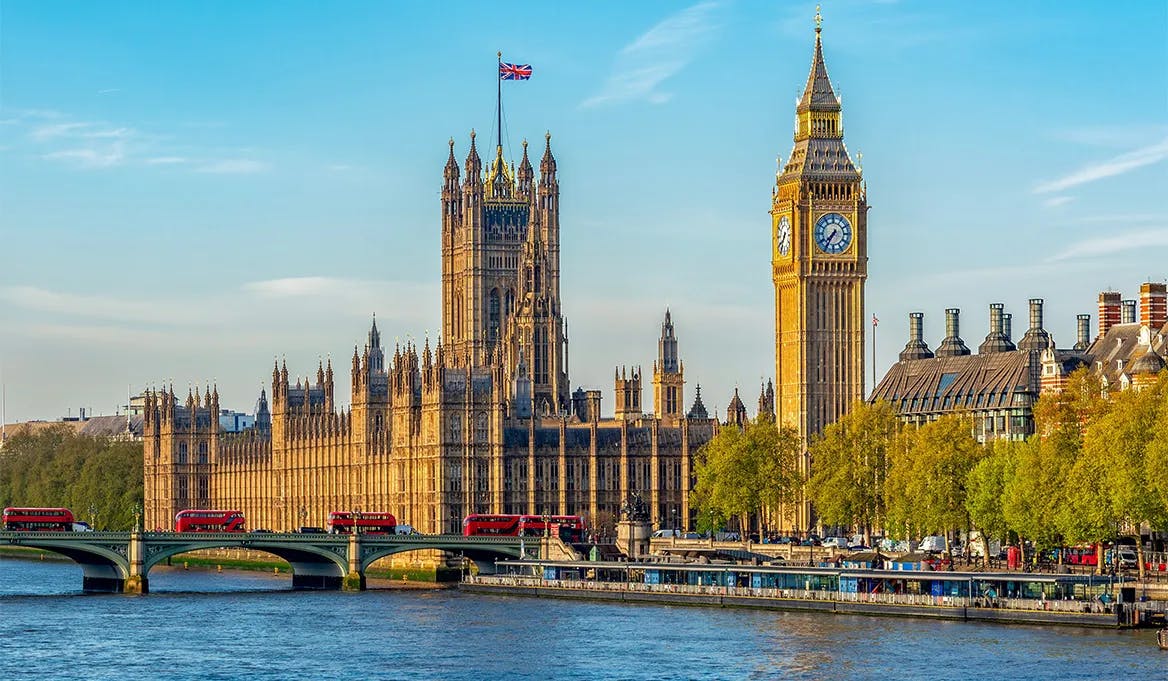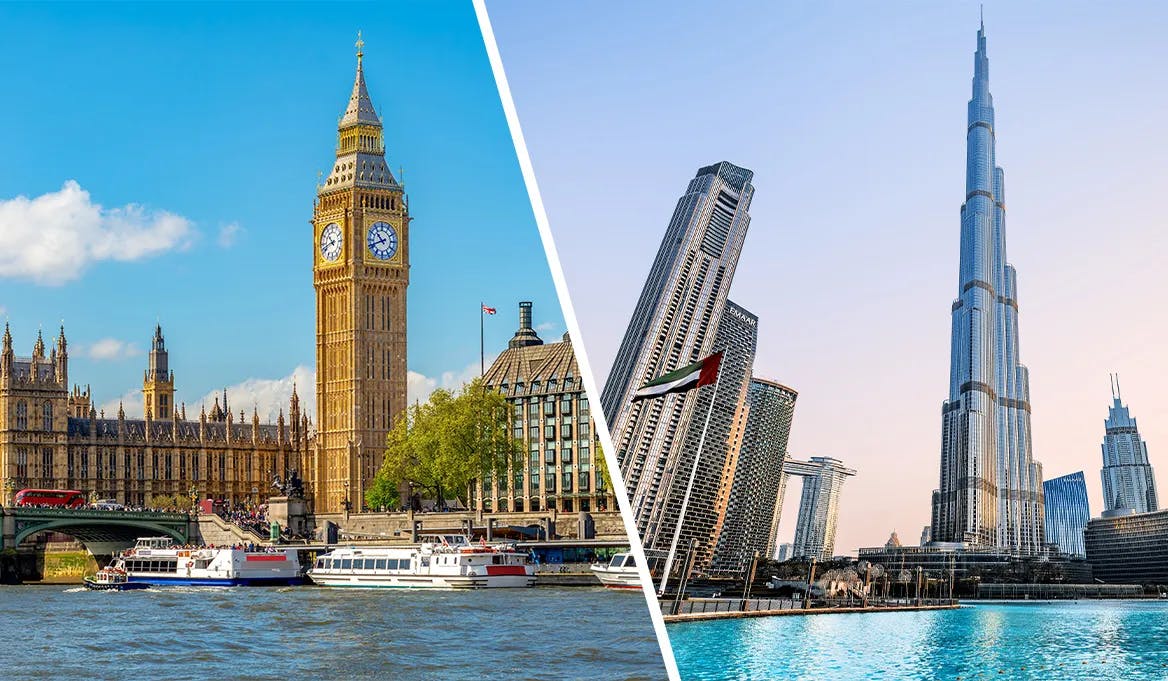
Real Estate Investment Comparison: UK vs. UAE
Oct 16, 2024
9 minutes read
The world of real estate investment is vast, and choosing the right market can make all the difference. Both the UK and the UAE have become key players in the global real estate scene, attracting investors from all corners of the globe. While the UK has a long-established reputation for offering a stable and reliable investment environment, the UAE, with its rapid rise in real estate development, presents a dynamic and fast-paced alternative. In this article, we'll compare these two distinct markets and help you navigate the potential risks and rewards of each.
UK Real Estate Market Overview

The UK real estate market is renowned for its maturity and resilience. It’s a market that has seen centuries of development, creating a strong legal framework and a steady flow of demand, particularly in major cities like London, Manchester, and Birmingham.
Stability and Maturity
The key to understanding the UK real estate market lies in its stability. Despite global economic shifts and the occasional housing market dip, the UK has remained a trusted market for investors. London, for example, is a global financial hub, attracting high-net-worth individuals and institutional investors seeking long-term capital appreciation. This mature market is characterized by a strong regulatory environment that protects both buyers and sellers, making transactions more secure and transparent.
Top Cities for Investment
While London is often the first city that comes to mind for investors, cities like Manchester and Birmingham have also gained significant attention. Manchester, with its booming tech industry and burgeoning population, has become a hotspot for buy-to-let investors. Meanwhile, Birmingham, often referred to as the UK's "second city," is seeing a renaissance, particularly in commercial real estate. The government's focus on regional development has made these cities attractive to investors seeking higher yields outside of London’s pricey real estate market.
UAE Real Estate Market Overview

Image Credit: arabian business
The UAE, particularly Dubai and Abu Dhabi, has seen explosive growth in the real estate sector over the last few decades. Known for its futuristic architecture, luxury developments, and ambitious infrastructure projects, the UAE offers a vastly different landscape compared to the UK.
A Dynamic and Rapidly Growing Market
In contrast to the UK’s slow and steady growth, the UAE real estate market is characterized by rapid expansion and innovation. Dubai, in particular, is the poster child of modern real estate development, offering an array of properties ranging from high-end luxury apartments to commercial spaces in iconic skyscrapers. Abu Dhabi, while more conservative, has focused on long-term sustainable growth, balancing luxury with practical, everyday living spaces.
Attracting Global Investors
One of the most appealing aspects of the UAE market is its ability to attract a global clientele. High-net-worth individuals are drawn to the lifestyle and tax incentives offered by Dubai, while Abu Dhabi’s reputation for stability attracts a more conservative investor base. For those looking to enter the luxury property market, the UAE offers opportunities that are unparalleled in terms of design, exclusivity, and prestige.
Market Stability and Volatility

UK: A Stable but Slower Growth Environment
The UK is synonymous with stability, making it an ideal market for conservative investors. Property values tend to appreciate at a steady pace, with less fluctuation compared to emerging markets. This is partly due to the country’s well-established infrastructure and regulatory systems that support long-term growth. Even in times of economic uncertainty, the UK real estate market remains resilient, bouncing back relatively quickly after downturns.
UAE: High Growth Potential with Greater Volatility
While the UAE offers tremendous growth potential, particularly in Dubai, it also comes with higher volatility. The market is heavily influenced by global economic conditions, and property prices can fluctuate more dramatically than in the UK. For instance, the global financial crisis of 2008 had a significant impact on Dubai’s property market, but the city has since rebounded, continuing to attract investors with its lucrative returns.
Types of Properties

Image Credit: propane.com
UK: Residential and Commercial Investments
In the UK, the choice between residential and commercial properties often depends on the investor’s goals. Residential investments, particularly buy-to-let properties, are popular among those looking for steady rental income. Cities like Manchester and Liverpool have seen a surge in demand for rental properties due to their growing populations and affordable housing options. On the commercial side, London remains a magnet for office space investment, especially in the financial district.
UAE: A Mix of Luxury, Residential, and Commercial Properties
The UAE market is diverse, offering everything from luxury villas to high-end apartments and commercial properties. Dubai’s luxury property market, in particular, has seen a massive influx of interest from overseas investors, with properties in areas like Palm Jumeirah and Downtown Dubai fetching premium prices. However, more affordable options are also available, especially in the outskirts of Dubai and in Abu Dhabi’s more residential areas.
Legal and Regulatory Framework

UK: A Well-Defined Legal System
The UK’s real estate market benefits from a robust and well-defined legal framework. The process of buying property is transparent, with well-established regulations that protect both buyers and sellers. This legal security, combined with clear property ownership laws, gives investors peace of mind when purchasing real estate in the UK. Additionally, foreign investors have relatively easy access to the UK property market, with few restrictions on property ownership.
UAE: A Growing, Investor-Friendly Market
In recent years, the UAE has made significant strides in creating a more transparent and investor-friendly regulatory environment. The introduction of freehold property zones has allowed foreigners to own property in designated areas without requiring a local partner. This has opened up the market to a global audience, making it easier for international investors to purchase and manage property in the UAE. However, it’s worth noting that the UAE’s regulatory framework is still evolving, and potential investors should stay informed about any legal changes.
Taxation

UK: Property Taxes and Capital Gains
In the UK, property taxes can have a significant impact on returns. Investors must factor in Stamp Duty Land Tax (SDLT), as well as capital gains tax when selling properties. For foreign investors, the SDLT can be higher, which may reduce the overall profitability of the investment. However, tax reliefs and deductions, such as those available for buy-to-let properties, can help offset some of these costs.
UAE: A Tax-Free Environment
One of the most attractive features of the UAE real estate market is its tax-free environment. There are no property taxes, no capital gains taxes, and no income taxes on rental income. This is a significant advantage for investors, particularly those looking to maximize their returns without the burden of heavy taxation. However, investors should be aware that the absence of taxes doesn’t mean the market is risk-free; other factors, such as maintenance costs and potential vacancies, can affect profitability.
Investment Returns

UK: Steady but Modest Yields
In the UK, rental yields are generally modest but stable. London, in particular, offers lower rental yields compared to cities like Manchester or Birmingham, where buy-to-let investors can expect higher returns due to lower property prices and high demand for rental properties. However, the UK’s stability and long-term capital appreciation make it a reliable choice for those seeking steady, predictable returns over time.
UAE: High Yields with Greater Risk
In contrast, the UAE offers much higher rental yields, especially in cities like Dubai. It’s not uncommon for investors to achieve double-digit returns, particularly in popular areas such as Dubai Marina or Business Bay. However, these high yields come with greater risks, including market volatility and potential oversupply, which could impact long-term returns. Investors should carefully consider the balance between high potential returns and the associated risks in the UAE market.
Foreign Investment Opportunities

Image Credit: onehomes.com
UK: Open but Regulated
The UK has long been a popular destination for foreign investors, and the market remains open to international buyers. However, recent changes in tax policies have introduced higher SDLT rates for non-resident buyers, making it slightly more expensive for foreign investors to enter the market. Despite these changes, the UK remains a relatively easy market for foreigners to navigate, with clear ownership rights and minimal restrictions on property purchases.
UAE: Reforms Driving Foreign Investment
The UAE has made significant reforms to attract foreign investment, particularly through the introduction of freehold property zones. In these areas, international buyers can own property outright, without the need for a local sponsor or partner. This has made the UAE one of the most accessible markets for foreign investors, particularly those interested in luxury properties or high-yield commercial investments. With continuous reforms aimed at making the market even more appealing, the UAE remains a top choice for international investors looking for high returns.
Risks and Challenges

UK: Regulatory and Economic Shifts
While the UK market is stable, it’s not without risks. Changes in government policy, such as Brexit, have introduced uncertainty, particularly in the commercial property sector. Additionally, economic factors like inflation and interest rates can affect property values and rental demand. Investors need to be aware of these macroeconomic factors when considering the UK as a long-term investment destination.
UAE: Volatility and Oversupply
In the UAE, market volatility remains one of the biggest risks. While the potential for high returns is attractive, the market can be unpredictable, particularly in Dubai, where oversupply in some areas has led to price drops. Investors need to be cautious about where they invest and should consider the long-term sustainability of their investments in this rapidly evolving market.
Making the Right Choice: Navigating Investment Opportunities in the UK and UAE Real Estate Markets

In the end, both the UK and UAE offer unique advantages for real estate investors. The UK provides a stable, well-regulated market with steady returns, making it ideal for long-term, risk-averse investors. The UAE, on the other hand, offers higher potential returns and a tax-free environment but comes with greater risks due to market volatility and rapid development. Your choice ultimately depends on your investment goals, risk tolerance, and the type of property you’re looking for. Whether you seek stability or high growth, both markets present valuable opportunities for savvy investors.
We hope this article has helped you gain a clearer understanding of the real estate investment opportunities in the UK and UAE. If you're ready to take the next step and explore how you can grow your investment portfolio in these markets, now is the time to act! Start making informed decisions about your real estate investments today. Whether you're looking for long-term stability in the UK or high-growth potential in the UAE, don't miss out on the potential returns each market offers.
Take control of your financial future. Contact us now for personalized investment advice and opportunities!



